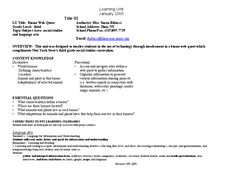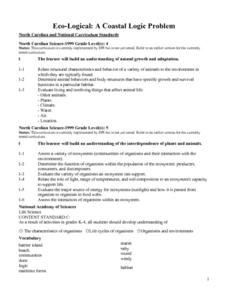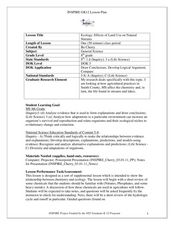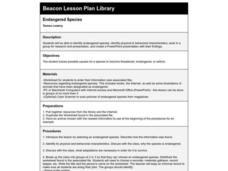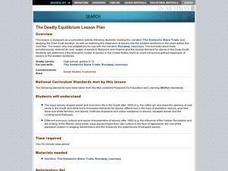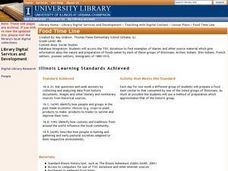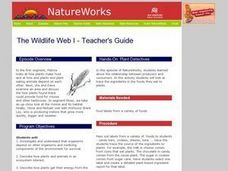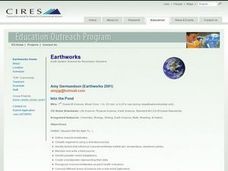Curated OER
Come to Mommy
Fourth graders participate in a simple experiment to illustrate the concept of mother bats identifying their young. They sniff stickers in order to imitate the behavior of mother bats in the wild.
Curated OER
Mussel Movements
Young scholars consider the impact of invasive species on local environments. In this ecology lesson plan, watch the video, Arizona Wildlife Views, which focuses on invasive species. Students develop vocabulary, relate to meaningful...
Curated OER
Desert Xeriscaping
Seventh graders identify native species of desert vegetation, plan a xeriscape landscape, and recognize the importance of water conservation.
Curated OER
Geography and Ecology of the Inuit
Students examine environment and ecology of the Arctic region, and explore history and traditions of the Inuit.
Curated OER
Biome Web Quest
Third graders create paper mache globes, paint them and label the oceans and the continents. In groups, they research a biome, write about it and create an artistic visual representation of the biome and present it to the class.
Curated OER
Eco-Logical: A Coastal Logic Problem
Fourth graders study the characteristics of five coastal communities. They use logic cards and matching activities to identify the proper community for plant and animal species.
Curated OER
Desert Xeriscaping
Students recognize native species of desert vegetation while examining the need for water conservation. They design and create a xeriscape landscape using a variety of materials.
Curated OER
Meet You at the Midden: Map Game
Fourth graders use a sketch map to interpret map symbols in order to participate in a game. Using the game cards, they identify reasons why people modify their environment to meet their needs. They compare and contrast how people lived...
Curated OER
The Things We Do
Fourth graders conduct a literature study in order to investigate the concept of change and how it occurs in the environment. The teacher uses the method of concept development for investigation.
Curated OER
Goobers. Goobers? Goobers!
Learners begin the lesson by noting the many ways in which to use peanuts. In groups, they use the internet to research the work of George Washington Carver. They discover the allergies and nutritional information of the peanut and...
Curated OER
Biology Chapter 15 Word Search Puzzle
In this biology worksheet, students look for the words that are related to the theme of the worksheet. They also work on the skills of spelling and word recognition.
Curated OER
Ecology: Symbiosis
Eighth graders identify various types of symbiotic relationships. In this ecology lesson plan, 8th graders predict whether certain organisms can form symbiosis with other organisms. They discuss and defend their reasoning.
Curated OER
Ecology: Effects of Land Use on Natural Streams
Eighth graders examine how humans affect various ecosystems. In this ecology lesson, 8th graders discuss different ways that contaminants enter the stream. They explain the consequences of eutrophication in lakes.
Curated OER
Saving Habitat
Students pick an animal native to Maryland and research how populations of that animal might be affected by land use changes over the past thirty years. They predict population trends for the next thirty years.
Curated OER
Cockroaches
Students listen to a lecture on cockroaches. They work in pairs to design a cockroach trap and attempt to trap a specimen. They complete various other cockroach-related activities.
Curated OER
Working with Willows
Students explore their sense of touch and discover why the sense of touch is important to us and to how we observe and identify our world.
Curated OER
Endangered Species
Students conduct Internet research on endangered species. They select an endangered species, identify its physical and behavioral characteristics, and create a Powerpoint presentation.
Curated OER
The Deadly Equilibrium Lesson Plan
Students read a narrative "The Domestic Slave Trade" and answer questions about states' slave trading. They read another narrative "Runaway Journey" and answer questions about runaway slaves. They discuss the impact of the slave trade on...
Curated OER
Food Time Line
Fourth graders make a timeline to include the immigrants of 1880-1910. Then, in groups, they research foods consumed, purchase, and serve it to the class.
Curated OER
Ambush Warriors
Students identify four different categories of reptiles and explain how snakes deliver their venom to their prey.
Curated OER
The Wildlife Web I
Students explore the relationship between producers and consumers. In this activity, they trace the ingredients in the foods they eat to plants. Supplement to Natureworks episode from New Hampshire Public Television, but activities may...
Curated OER
Into the Pond
Seventh graders use a pond to explore macroinvertebrates and other organisms. They use a dichotomous key to classify the organisms and maintain a journal recording their findings.
Curated OER
What Kind of Insect is That?
Fifth graders characterize insects and classify insects according to the Linnaean system. They use hand lenses or microscopes to examine insect body parts.
Curated OER
"Habitats"
Students complete a unit of lessons on animals and animal conservation. They observe a square meter of ground outside the school, set up a model environment, analyze an owl pellet, grow bread mold, and explore various websites.






